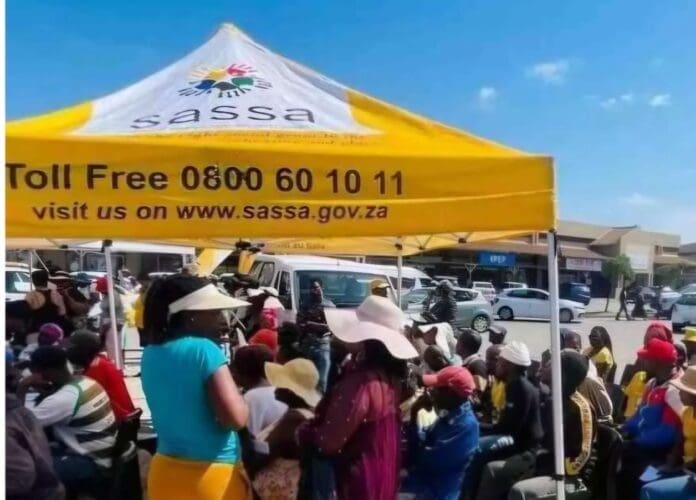Social Relief of Distress (SRD) grant recipients may face payment disruptions as SASSA has allocated only three days for February 2025 disbursements, compared to the seven days in January.
This reduction comes amid ongoing challenges linked to the transition from the SASSA (South African Social Security Agency) Gold Card to the new Postbank Black Card, which has already resulted in long queues, delays, and system failures.
In January 2025, the R370 SRD grants were processed from January 25 to 31, providing a full week for beneficiaries to receive payments. However, in February, SASSA has scheduled payments for only three days (February 26 to 28 – which were changed today, Friday as shown in the SASSA X post below, from the initial five days)—a shorter window that coincides with an already compressed calendar month.
Given the existing backlog in Gold Card replacements and frequent service disruptions, this reduction in payment days could spell trouble for beneficiaries who rely on these grants for survival.
Card transition and the growing backlog
Postbank, which is spearheading the Card transition, has acknowledged major hurdles in the switchover process. Over two million beneficiaries still need to transition, with Postbank falling significantly behind its target issuance rate. The slow progress—previously averaging 2,300 to 3,500 cards per day between November and January—has only recently increased to 10,400 cards per day following urgent communication efforts.
During a presentation to Parliament’s social development committee on Tuesday, February 18, Postbank CEO Nikki Mbengashe stated:
“The main reason was that 90% of the time, people were just not showing up. Our tellers were sitting there doing nothing for the first three months. Yes, intermittently the connection to Home Affairs was 10% to blame, but truly 90% of the reason was because people just didn’t show up.”
Recognising the urgency, Postbank has partnered with Spar Group, which will designate 200 stores nationwide as service points where beneficiaries can collect their Black Cards.
“We’ve negotiated with Spar because, although we have sites, the issue is people to man them. Training takes five days, and recruitment and vetting are required. We needed a partner who could provide people familiar with financial services to do the job on our behalf,” Mbengashe said.
To speed up the process, Spar tellers, already experienced in financial transactions, will undergo an accelerated training program, reducing the usual five-day training period to just two days through on-the-job learning.
A tight timeline and increased pressure
SASSA’s Acting CEO, Themba Matlou, acknowledged communication issues with the transition and stated:
“We have identified major hotspots and are introducing special outreach interventions to target these areas.”
To ease congestion, community halls are being used as additional service points to provide shelter and ablution facilities while beneficiaries wait. SASSA has also deployed two employees per site to assist and prioritise services for elderly and frail individuals.
“We have deployed two SASSA employees at each site to assist with managing queues, and to expedite services for older individuals and those who are frail. This extended operational time will allow us to process more beneficiaries more quickly,” Matlou said.
Additionally, the Social Grant Payment System has extended operating hours:
“The agency has also extended the hours of the Social Grant Payment System, which will now operate from 6am to 7:30om including weekends, until April 2025.”
Postbank has assured beneficiaries that sites will remain operational beyond extended March 20 card transaction deadline to assist those who have yet to transition.
“If people get their grant in March, they have almost the whole of March to get the Black Card. We will continue increasing sites to prevent a backlog in April,” Mbengashe said.
Despite these efforts, with millions relying on SRD payments for basic survival, the reduction in processing days could exacerbate financial hardships if delays, long queues, and technical glitches persist. Beneficiaries must act proactively to secure their payments and avoid last-minute complications.
What beneficiaries should do to avoid payment issues
With fewer payment processing days in February and the high risk of disruptions due to the ongoing card transition challenges, SRD grant recipients are strongly advised to:
- Ensure their Gold Card Is still active: If their SASSA Gold Card is still valid, they should use it to withdraw funds as early as possible in the payment period.
- Switch to the Black Card immediately: Beneficiaries who haven’t made the switch should visit a Postbank branch, Post Office, or one of the designated Spar outlets to obtain their new card before the March 20 deadline.
- Verify banking details with SASSA: Those using a personal bank account for SRD payments must confirm that their banking information is correct to avoid payment failures.
- Withdraw grants promptly: Given the shorter payment window, beneficiaries should collect their grants as soon as they are available to avoid potential last-minute system failures or delays.
- Check official SASSA and Postbank announcements (social media platform – X (formerly Twitter) & Facebook –as well as SASSA website): Staying informed about any last-minute changes, extended hours, or alternative payment arrangements can help avoid unexpected setbacks.
With millions relying on SRD payments for basic survival, the reduction in processing days could exacerbate financial hardships if delays, long queues, and technical glitches persist. Beneficiaries must act proactively to secure their payments and avoid last-minute complications.


